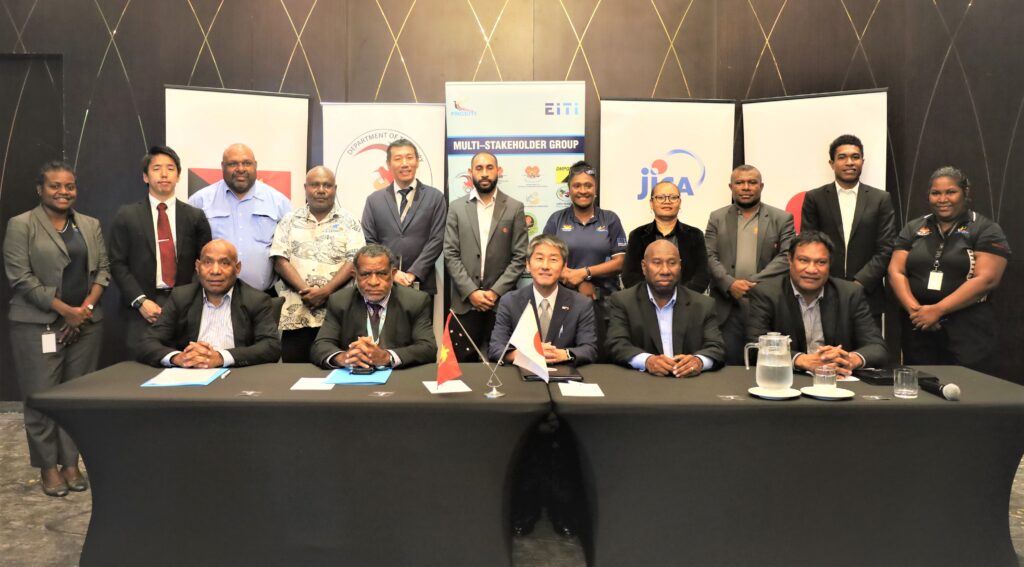PNGEITI & JICA SIGN TECHNICAL COOPERATION DISCUSSIONS RECORDS TO IMPROVE DATA QUALITY IN PNGEITI REPORTS
Left to Right: PNGEITI Head of National Secretariat Mr. Lucas Alkan, PNGEITI MSG Acting Chairman Mr. John Uware , JICA Chief Representative Mr. MATSUOKA Hideaki, and Mr. Channan Kumalau of the Department of Petroleum after the signing today.
PORT MORESBY: A three-year technical cooperation between the PNG Extractive Industries Transparency (PNGEITI) and JICA will boost data transparency in the PNG Mining and petroleum sectors.
This will be made possible with the signing of “Record of Discussion” between PNGEITI Stakeholders and JICA experts undertaken in August this year.
The Record of Discussion which forms the basis for the execution of the technical cooperation was signed in Port Moresby today by Mr. John Uware who is acting Chairman of the PNGEITI Multi- Stakeholder Group with Mr. Matsuoka Hideaki from the JICA side.
This signing marks phase two of the JICA/PNGEITI technical cooperation aimed at Improving Resource Related Revenue Management through enhanced EITI Reporting. This second phase will commence in March, 2024.
The PNGEITI Head of National Secretariat Lucas Alkan thanked the Government of Japan through JICA for its continued support in the Government of PNG’s effort to implement the EITI Global Standard to improve extractive sector governance. He acknowledged JICA for coming on board for the second time to help improve extractive transparency which is the core mandate of the EITI – in the PNG Mining and petroleum space.
“PNGEITI is happy that we’ve signed on the record of discussions that was conducted within the month of August by JICA experts”, Mr Alkan said.
“The second project will be undertaken by JICA experts to continue building and improving capacity at the Department of Petroleum and Energy from work that was undertaken in Phase 1 of the project and at the same time, focus on building capacity at the Auditor General’s Office to improve financial data quality, reliability and timely availability of resource related data and information for public use,” Mr. Alkan explained.
The Head of PNGEITI Secretariat said that the three-year program would basically pick up from where JICA had left off at the Department of Petroleum and Energy when Phase 1 of the project ended a year ago and determine ways to improve the quality of the financial data for EITI reporting and to ensure that more resources-related information is made publicly available for transparency purpose as required by the EITI Global Standard. The project is also intended to assist strengthen capacity at the Auditor General’s Office to ensure that the financial data that are used in the EITI annual reports are audited and are reliable to improve the quality of these reports.
Mr Alkan said the JICA technical cooperation program in that it will specifically focus on building and strengthening capacities at two key government organisations; the Department of Petroleum and Energy and the office of the Auditor General. Addressing weaknesses in data reliability and quality in these two agencies would be important to the work of the PNGEITI Secretariat in its endeavour to addressing the data and information gaps as highlighted through the EITI reporting process.
Present during the occasion included key representatives from beneficiary government entities, namely the Department of Petroleum and the PNG Office of the Auditor General.
ENDS.
Approved for Release by Mr. Lucas Alkan
PNGEITI Head of National Secretariat








